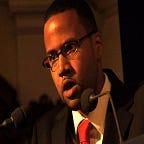Dubois, Double Consciousness and the Mulattoisation of America
“It is a peculiar sensation, this double-consciousness, this sense of always looking at one’s self through the eyes of others, of measuring one’s soul by the tape of a world that looks on in amused contempt and pity. One ever feels his two-ness, — an American, a Negro; two souls, two thoughts, two unreconciled strivings; two warring ideals in one dark body, whose dogged strength alone keeps it from being torn asunder. The history of the American Negro is the history of this strife — this longing to attain self-conscious manhood, to merge his double self into a better and truer self. In this merging he wishes neither of the older selves to be lost. He does not wish to Africanize America, for America has too much to teach the world and Africa. He wouldn’t bleach his Negro blood in a flood of white Americanism, for he knows that Negro blood has a message for the world.” W E B Dubois
W E B Dubois was one of the great thinkers of the 20th century. Born into a mulatto family of French and African descent in the late 19th century, Dubois would become one of the most quoted intellectuals in black thought and history. Dubois wrote over 20 books and was an observer and actor in some of the most important events of the 20th Century. A pioneer in the African decolonisation movement and attendee at the first Pan-African Congress in London in 1900; Dubois visited Nazi Germany in 1936, he met and spoke at length with Chinese Communist revolutionary, Mao Tse Tung and was a friend of acclaimed scientist Albert Einstein, talented black American thespian, Paul Robeson and African decolonisation leader Kwame Nkrumah. He argued with Booker T Washington and controversial race thinker Marcus Garvey and played a leading role in the formation and development of the NAACP after becoming the first man of colour to be awarded a PhD at Harvard.
Dubois is most well known for two major ideas; The Talented Tenth and Double Consciousness.
As a mulatto, Dubois was the physical personification of the concept and experience of double consciousness. Raised by mulatto parents in an integrated but predominately European community, Dubois was more than aware of the experience of double consciousness. As a mulatto he was a living embodiment of the two warring souls that he believed existed in black America. A man of colour with the blood of Africa and the blood of Europe running through his veins; a man considered part of the Negro race but possessing the mind of a European and the consciousness of the western enlightenment; a man who appeared as neither black or white; Dubois was the embodiment of the New America.
Dubois was a symbol of the “mulattoisation of America”; a symbol of what racial integration between white and black America could achieve in the human and a symbol of the future browning of America. It was Dubois who cannily argued that the NAACP use the term “Coloured” rather than black in order to provide representation for all dark skinned people of the world; something that incensed the likes of Marcus Garvey who rejected the term coloured as the lightening of the negro race and called for the standardisation of mulattoes as negroes rather than the hybrid coloured that many had in fact become.
When Marcus Garvey preached “Africa for the Africans” and racial seperatism and challenged the mulatto population that often made up the leadership of black America via organisations such as the NAACP or the Tuskegee Institute led by Booker T Washington, Dubois challenged Garvey and argued that he was neither an assimilationist or a seperatist but was committed to enduring hybridisation.
In many ways Dubois was a pioneer in mulatto consciousness. In paying attention to his own mulatto psychological experience, an experience that he believed was shared by black America, Dubois was able to imagine a future of America that was beyond the racial parameters of black and white. He was insightful enough to consider the terms that he believed most appropriate and to acknowledge the growing “mulattoism” by embracing the term coloured rather than negro as a descriptive term for the many hues that demanded civil rights in America. A hundred years prior to Obama, Dubois was searching for a post-racial America.
Dubois agreed with Garvey’s powerful slogan, “Africa for the Africans”; he just did not believe in the idea that Africa was for African-Americans. Dubois was without doubt that the mulatto consciousness that enshrouded black America was better expressed in the Americas and that out of the dialectical struggle between negro and European forces in America would come a hybrid culture and psychology that may light up the world and bring an end to Americas racial conflicts.
For Dubois, the black American, stuck between two worlds was the catalyst for the birth of a New Historical People. The double consciousness that black America experienced as a form of internal struggle; the double consciousness that was expressed in the physicality of the mulatto populations was not something to be ashamed of but to be embraced as a way towards synthesis between the African and European world.
ALT
